|
Your work can be split into three
areas. Firstly the Nick Stefanos series, The Washington Quartet,
and now the world of Strange and Quinn, while Shoedog (recently
republished) stands outside those three series. Can you tell us
about how Shoedog came about? |
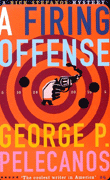

|
I was reading a lot of classic pulp/noir at the time, mainly David
Goodis. I wanted to try to write one myself, knowing full well that
there was no commercial potential whatsoever for a book of that kind
in the modern market. Also, it was my first attempt at a third
person novel. It would also give me an opportunity to write about
two things very dear to me: women's shoes (and feet) and 60s
American musclecars. With a book of this kind there are no rules,
and that was very appealing to me as well. No one read Shoedog
in the States, but it got me some attention in France.
|
|
Prior to your writing career you did
a series of blue-collar jobs. Did you always feel that you would
become a published writer? |
|
No. I only dreamed about it. And the fact that I was smoking weed at
the time furthered those dreams…dreams, I should say, without
productivity. When I was smoking pot I had grandiose thoughts of
becoming a writer, and grandiose thoughts of plenty of other things,
too. Books, movies, and beautiful women were waiting for me, just
around the corner. It wasn't until I stopped getting high that I
actually sat down and got to work. Not that there's anything wrong
with getting your head up now and again, you know?
|
|
Yep I agree…..So what attracts
you to the blue-collar world of crime, corruption and the dark
side of human nature? |
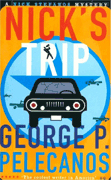

|
People who live on the edge financially are much more susceptible to
a life of crime. I think it's more realistic to approach the topic
from that side of society. And I know something about it. |
|
Nick Stefanos travels on a journey
and despite being pretty beaten up along the way, there is still a
strand of hope and a social conscience which in your later work is
even more apparent. Why is social awareness so important to you? |
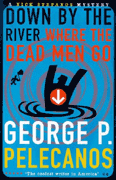
 |
A book should be about something other than the author's bank
account, or it's not worth writing. If you can raise some questions,
and challenge the reader to look at his or her world in a different
way than they did before, then you have done something worthwhile.
Stefanos, in the first book, is an autobiographical character. He
still is, I suppose, which is why he keeps turning up in the novels,
no matter their period. But the elements of his character differ
from those of mine now. He didn't change, and I did.
Writing the first book was scary, because I had no idea as to what
I was doing, but also exciting. There were no expectations, so there
was a good amount of freedom to do anything I wished. In fact, my
first five novels were like that. I was writing for little money so
the publisher was at little risk. I felt like I could experiment
and, and long as I delivered a "good" book, could try
anything in terms of bending the genre conventions. In this period I
was working a full time job in the daytime and writing at night, as
well as building a family, so my life was not without strain. But in
general it was liberating. I have always felt lucky that I was given
this time, in a low-key way, to work on my craft.
|
| At
which point in our career did you consider taking up fullt-ime
writing? |


|
When I sold King Suckerman to the movies (since returned to
me) I scored to the degree that I thought I could give it a shot. It
has worked out fine, but I have to say that, between novels and
screenwriting, I am working as hard as I ever have. I got into the
film business to promote John Woo's The Killer. Distribution
and production were a logical progression for me. I always wanted to
write movies and television, so I made my move when the opportunity
presented itself. I am doing damn near everything I've wanted to do
since I was a kid.
I do a month or two of research, have a general idea of what I am
trying to accomplish, then sit down to write the book. I don't
outline plot but at this point the book is somewhere in my head.
Once I find the characters it lifts off. As for the actual work, it
is intense. I work seven days a week, writing in the day and
rewriting at night, until I have a clean first draft. My family
loses me four to six months a year.
|
|
There is positive cynicism in your work,
where you examine the system from the lower rungs of the ladder but
yet you show the system with benevolence as well as malevolence. Why
does the system interest you so much? |
|
 |
Well, there has to be a balance between the system and total
anarchy. The question I am asking is, where is that found? All
systems have the ability to corrupt and, more importantly, destroy
those who try to play outside the rules. This goes for cops as well
as kids who get into the drug game. I'm fascinated by those
dynamics.
|
|
Your books can be viewed as modern westerns and I know you are a
keen western movie buff. Can you tell us which westerns influenced
you? |
|
|
John Ford. Peckinpah. Sergio Leone. John Sturges. Clint Eastwood.
Robert Aldrich made some good ones, too.
|
|
You cite Ross MacDonald, Raymond
Chandler and Hammett as early influences. Could you tell us which
books from those three authors have had the most profound effect on
you and your work? |
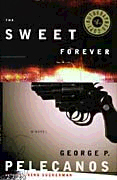

|
Hammett's The Glass Key and Chandler's The Long Goodbye
are literary masterpieces by any standard. They say that
MacDonald wrote the same book over and over again, but it was a damn
good book. The Galton Case is my favourite. |
| In
the UK you were first published by Serpent's Tail, but have since
moved over to Orion. Can you tell us why? |
|
The money offer from Orion was
significantly higher, and I have a family. Plus, the folks at Orion
are really good people and have done a fantastic job for me. Having
said that, I owe ST publisher Pete Ayrton (and his staff) a
tremendous amount of debt. Pete was the first in the world to
publish me in paperback, and what happened in the UK because of the
Serpent's Tail effort got me going everywhere else. I've been
blessed to be with both houses. And both have shown this Greek boy a
good time on my frequent visits to the UK. |
| Because
of the hardboiled nature of your work, which with the Quinn/Strange
series is becoming even more socially conscious. Are you as a result
getting more female readers? |
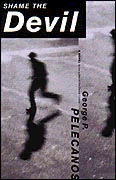
 |
I don't know. And honestly, I don't
think about it when I'm writing. It's a fact that the audience for
American crime fiction is primarily female; consequently, you'll see
some male writers go with female protagonists so they can capture
that market. The result of this pandering is often a commercially
successful but compromised book. I do like to explore issues of
masculinity in an honest way. If women are interested in that world,
then by all means, I invite them in. In the end, I've got to
believe that men and women alike will want to read a compelling
novel. |
| You
toy with the idea of vigilante justice in many of your books with
your characters often caught up in doing what's right, which I guess
returns us back to the western' ethos. Would you care to talk about
why your characters sometimes move away from using the law for
justice? |
|
There has always been a strong
element of vigilantism in American culture, and a distrust of
authority and the law, which is why our citizens are so violently
opposed to any laws that might restrict their rights to own guns. I
don't condone the act of personal retribution. But I would be a liar
if I said that I didn't understand it. |
| Looking
back over The Big Blowdown, King Suckerman, The Sweet Forever and
Shame the Devil, did you consciously realise that you were going to
write a loosely knitted series? |
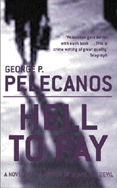
 |
When Nick Stefanos showed up as a
baby in the end of The Big Blowdown -something I did not
plan - the idea began to take shape. The inspiration was ambition. I
wanted to write a book that was bigger and had more scope than
anything I had previously written. My Once Upon a Time in D.C.
The 30s and 50s was the era in which my grandparents and parents
lived as children and young men and women. I wanted to explore the
immigrant experience in America and send a hard valentine from my
family. It was also my chance to write a real noir (not a modern
imitation of noir) and a big, Warner Brothers-style crime novel in
the bargain. There was a tremendous amount of research to be done
before I started writing it, and once I did start…let's just
say that I put everything I had into that book in more ways than
one. I told myself early on that if it didn't work I was going to
stop writing novels. As it turns out, they are going to hang that
one on my fucking tombstone. |
| Your
first major black character was Marcus Clay in the second book King
Suckerman. Would you care to explain why black characters interest
you, as they feature in most of your books unlike many other
crime/mystery books? |
|
|
The population of D.C. is roughly 65-70% black, and has
been as high as 80%. If you are going to write crime novels set in
the inner city here, you cannot ignore that fact or those people.
Growing up in this area, and having lived nowhere else, I have
naturally absorbed some of the culture. If I get it wrong then
shame on me. And believe me, the people here will tell me if I get
it wrong. |
| The
genesis of the Quinn/Strange partnership seems to have roots back to
your early work. Would you agree? |
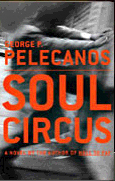 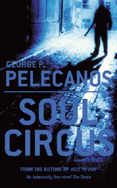
 |
Yes, in fact I would say it has its
genesis in the Marcus Clay/Dimitri Karras relationship that started
in King Suckerman.
In the beginning, it was my intention to have Quinn as a minor
character in Right as Rain, until he took his place
organically beside Strange. Originally, Rain was to have been
Strange's book.
The latest, Soul Circus, is an almost reportorial look at
the current situation in the American inner city. Reading it again
recently, I found it to be almost shockingly dark. If noir is about
claustrophobia and paranoia, then this one fits the bill. |
| And
finally can you tell us what you are working on, both on the film
front as well as what the next book is about? |
|
I am currently working as a writer
and story editor for the second season of the HBO television series,
The Wire. The first season aired in the US last summer (I
wrote episode 12) and will be broadcast in the UK sometime in the
future. My novel Hard Revolution, due out in 2004, will
focus on the week leading up to the Dr. King assassination and the
riots that occurred in its aftermath in Washington, D.C. It looks at
the little-discussed violent side of the civil rights movement and
how one black, working class family gets caught up in the struggle.
It's my Big Blowdown for the 1960s. |
| It
has been a pleasure to talk about your work, and thank you for
trying to come over and see us in the UK, and we hope to see you
when the elements don't conspire against us! |
|
You too, Ali. Nice meeting you in
Manchester last time, and sorry I couldn't make it this year. |
|
| Bibliography :-
· A FIRING OFFENSE · NICK'S TRIP · SHOEDOG ·
DOWN THE RIVER WHERE THE DEADMEN GO · THE BIG BLOWDOWN ·
KING SUCKERMAN · THE SWEET FOREVER · SHAME THE DEVIL ·
RIGHT AS RAIN · HELL TO PAY · SOUL CIRCUS · HARD
REVOLUTION (Due in 2004) |
|
Shots eZine wish to thank Gaby
Young of Orion Publishing for organising this interview |
|
www.georgepelecanos.com |